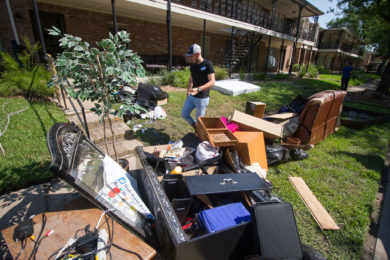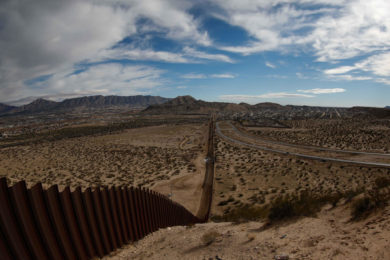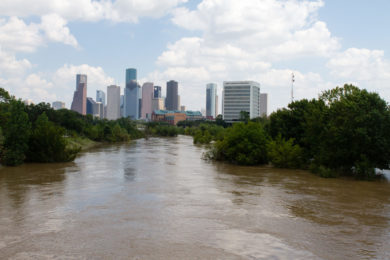September 1, 2017
Hurricane Harvey complicates Washington battle over a border wall
NATIONAL
By Rhina Guidos, Catholic News Service

Jonathan Cruz walks past piles of waterlogged home goods as residents in the Meyerland neighborhood of Houston begin to recover from Tropical Storm Harvey’s catastrophic floods Aug. 31. The Buffalo Bayou, which courses through the nation’s fourth largest city, surged past record numbers and flooded thousands of homes in Houston. (CNS photo/James Ramos, Texas Catholic Herald)
WASHINGTON (CNS) — Donald Trump’s promise of building what he called a “big, beautiful” border wall was a central theme of his candidacy for president. He reassured his supporters that the U.S. would build it and Mexico would pay for it. But in August, as president, Trump continuously threatened to shut down the U.S. government this fall if Congress does not fork over more U.S. taxpayer money to pay for it.
“If we have to close down our government, we’re building that wall,” the president said during an Aug. 22 rally with supporters in Phoenix.
Though he said in the past that Mexico would pay for the wall, Mexico is being “very difficult” at the moment and not wanting to pay for it, he said during the rally, so, he is asking the U.S. Congress for the money now, even though he insisted “one way or the other, Mexico will pay for the wall.”

The border between the U.S. states of Texas, New Mexico and Ciudad Juarez, Mexico, is seen in late January. Hurricane Harvey has complicated the battle in Congress over the building of the wall. (CNS photo/Alejandro Bringas, EPA)
Congress and the president have to arrive at some form of agreement over a spending bill, which includes more money for the wall, by Sept. 30, a day before the 2018 fiscal year kicks in, or risk a government shutdown. Congress, too, needs to address the issue of whether to raise the debt ceiling. Complicating matters, Congress and the president also will have to face in September a recent unforeseen and hefty expense: emergency funding for Hurricane Harvey and its aftermath in Texas and Louisiana.
Though the extent of the damage still is unknown, some like Texas governor Greg Abbott estimate the federal tab for cleanup will be “far in excess” of $125 billion, while others think it might be as high as $190 billion. It’s conceivable that Harvey could cost even more than what’s being speculated, turning it into the costliest natural disaster in U.S. history, which puts into question, and peril, other big-ticket items Congress had hoped to pass.
Some Catholic groups say part of the solution is simple: Don’t build the wall at all, which would eliminate about $1.6 billion from the budget for the 2018 fiscal year and even more down the line (the president said in April 2017 that the wall could cost $10 billion or less). The wall that Trump called “big” and “beautiful,” Catholic groups such as the Franciscan Action Network have called “sinful.” In April, members of the network joined faith leaders in a demonstration opposing taxpayer money to fund the wall, among other expenditures that also target undocumented immigrants.
In early 2017, the Scalabrini International Migration Network, which runs programs for migrants worldwide and is operated by the Congregation of the Missionaries of Saint Charles, known as the Scalabrinians, questioned the effectiveness of the wall Trump is seeking to build.
In the Phoenix rally, as in other occasions, the president said not building the wall exposes the country to drugs, creates a security issue and compounds the country’s immigration problem.
The Scalabrini network, which has extensive experience in migration issues, said in a Jan. 25 statement that the wall “would likely strengthen smuggling networks which will charge migrants high fees to get over, under, or around it. It also will disrupt commerce and relationships between border communities, destroy the local environment and force landowners, including Indian tribes, to surrender portions of their lands.”
In a 2017 study, the Center for Migration Studies in New York, affiliated with the Scalabrini network, widely criticized the president’s claims about the wall. Michael Chertoff, former secretary of the Department of Homeland Security, which oversees border patrol, said, along with other experts in the study, that the “wall does not add enforcement value except in heavy crossing areas.”

Houston’s skyline is seen as Buffalo Bayou still floods past its banks near downtown Houston Aug. 31 in the aftermath of Tropical Storm Harvey. (CNS photo/James Ramos, Texas Catholic Herald)
The study also found that since 2007, immigration visa overstays have outnumbered undocumented border crossers by a half million, meaning the wall won’t address the main method of entering the country and one that fuels the number of undocumented people in the U.S.
However, Trump said in the Phoenix rally that border patrol officers have told him building the wall is “vital.”
He said Democrats and others who oppose the wall are “obstructionists.”
“You are putting all of America’s safety at risk. You’re doing that. You’re doing that,” he said during the rally.
But Democrats aren’t the only ones opposing it. Members of his own party, including Republican Congressman Will Hurd of Texas voted against a spending package in July that included money for the wall.
Regardless of the funds available, Catholic groups and organizations, including the U.S. Conference of Catholic Bishops, have urged Congress not to fund the wall and remained steadfast in denouncing its construction and possible consequences.
“I feel discouraged because the president has set as a priority the construction of a wall on our border with Mexico, which will make the lives of immigrants unnecessarily endangered,” said Bishop Joe S. Vasquez of Austin, Texas, chairman of the U.S. bishops’ Committee on Migration, in a Jan. 25 statement issued shortly after the newly minted president announced his immigration policy.
Many U.S. church officials and organizations have repeated the sentiment expressed by the Scalabrini International Migration Network in the statement issued shortly after Trump took office.
“History shows that, in the long run, border walls do not work, as the forces driving persons to migrate — poverty, violence, corruption and the lack of accountability, persecution and the prospect of better lives — are stronger than any wall,” officials from the network said. “Rather, resources should be directed toward addressing the push factors which drive persons to flee their countries. Sustainable economic development is the long-term answer to irregular migration, not border walls.”
Some worry that Republicans will use some of the money for Harvey to partially fund the border wall, while others say that the natural disaster has given them an excuse to avoid funding an unpopular project. However, the wall clearly is dear to the heart of president and to his base and it’s one that he will not easily set aside.
Follow Guidos on Twitter: @CNS_Rhina


 Facebook
Facebook Youtube
Youtube
